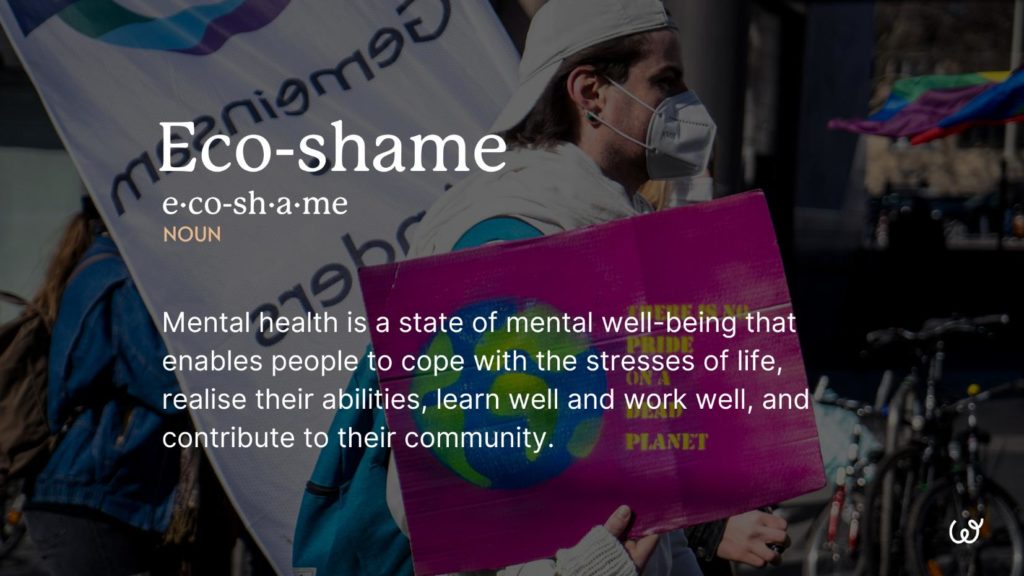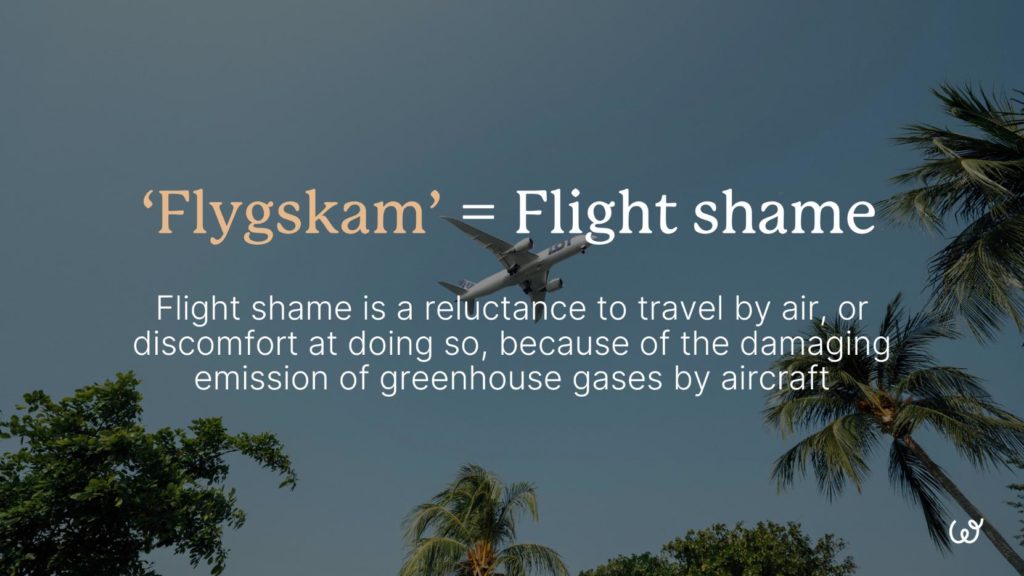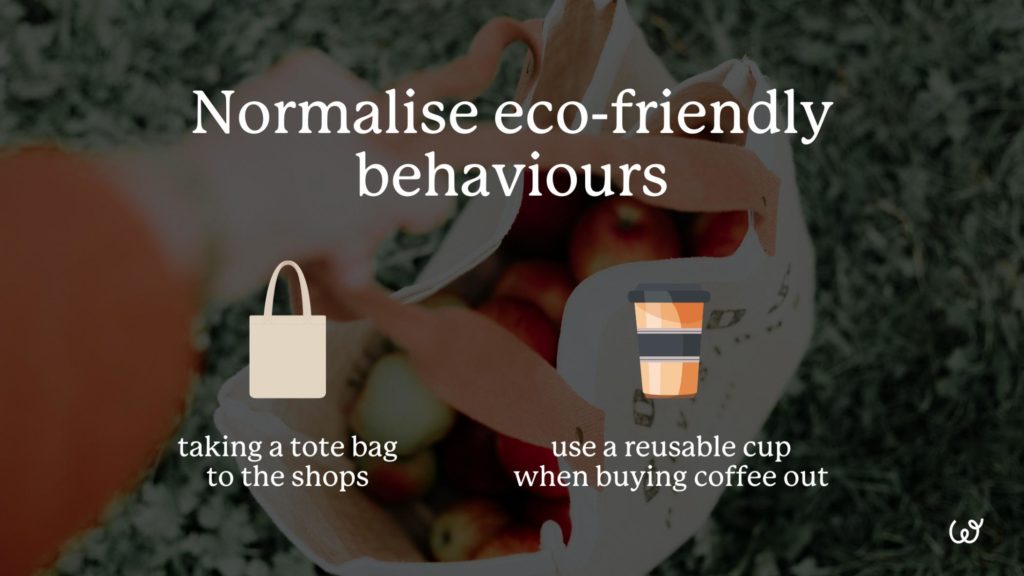Eco-shame, a rising phenomenon, includes highlighting an individual’s environmental inactivity, or lack of personal eco-awareness. Yet no one’s perfect, so who are we to judge?
The psychological impact of climate change can manifest itself in the form of eco-anxiety or eco-guilt. And if that wasn’t enough, eco-shame is now on the rise too.
Exhibit A: “I can’t believe you’re still using plastic bags! Don’t you care about the planet?”
Whilst comments like this are made in good faith to drive behavioural change or an eco-friendly lifestyle, they can be extremely counterproductive. Eco-shame often leads to feelings of guilt, defensiveness, and resentment rather than inspiring positive change.
Lately, there’s been intense social pressure surrounding sustainability and environmental (in)action. We find this leaves little room for reflection on your mental health and its effect on your interactions with others. So, take a breather; dive deeper into the complexities of eco-shame and its link with eco-guilt, green shaming, and eco-anxiety in our detailed guide.
Eco-shame: what is this rising phenomenon?

Definition of eco-shame
Whilst it doesn’t have a seat in the English dictionary, Urban dictionary defines eco-shame as ‘shaming another person for not respecting the environment’. Essentially, it’s an act of publicly criticising or judging another for their perceived lack of environmental responsibility. But is this encouraging environmental good, or is it just embarrassing and demotivating action towards the climate crisis?
For those who try their best to reduce their carbon footprints but slip up by forgetting their reusable bags every once in a while (it happens!), public confrontation and judgements can really hurt.
How eco-anxiety can make you eco-shame others
For some, shaming others can serve as a coping mechanism for managing their own eco-anxiety. Directing their outward focus to critiquing the behaviour of others, may temporarily alleviate their own feelings of despair about environmental degradation. It may feel like you’re planting seeds of change, but it’s often at the detriment of pruning a few branches along the way.
For others, eco-anxiety can trigger hypersensitivity to the climate crisis and feel a heightened sense of urgency to address the issues that concern them. Like a leaf caught in strong winds, eco-anxiety can cause you to snap at friends.This could be due to your view on their lack of recycling, carelessness around single-use plastics, or irresponsible fast-fashion choices.
How eco-anxiety can make you eco-shame yourself and result in eco-guilt
Eco-shame can create feelings of guilt around your own environmental inaction. You may think ‘I am not doing enough to save the planet?’.
We get it, it’s hard to avoid acts of harsh self-critique when it feels like you’re carrying the weight of the world on your shoulders. If so, we have one piece of advice for you: slow down, you’re not superhuman… (although we admit, it’d be pretty cool). You’re just human!
Research shows that people who focus on taking action in their local environment are more likely to cope with eco-guilt and climate-induced emotions. Remember:
- You can’t halt the production of meat, but you can reduce the amount you eat in your diet;
- You can’t end fast-fashion, but you can boycott brands and buy only pre-loved clothes;
- You can’t stop the global extraction of oil, but you can reduce your carbon footprint by increasing use of public transport or ditching it altogether;
- You can’t make deforestation disappear, but you can collaborate with local communities on conservation-based initiatives.
How does eco-shaming work in practice?
Situations where eco-shame can be felt
As the awareness and frequency of extreme weather events arise, so does eco-shaming. We all know that social media is the home of ‘keyboard warriors’; so it’s unsurprising that comment sections are rife with examples of eco-shaming. Despite the disdain online, it can also be seen in daily interactions, and is often fueled by an individual’s own eco-anxiety, or guilt.
Whilst environmentally conscious individuals are shamed for their inconsistent climate commitments, others are shamed for not thinking about the climate at all.
Unsurprisingly, you’ll also find that public figures, influencers, businesses, and governments are shamed for not doing ‘enough’. Although, with no rulebook on how to care for the planet, the line that marks out ‘enough’ is pretty murky in our eyes.
Examples and types of environmental shame
‘Flygskam’: a Swedish word invented to discourage people from taking to the skies. But what does it mean? Flight shame… Yes, really! With locals growing to be more conscious of their carbon footprint, it creates an intersection between individual behavior, environmental responsibility, and collective action in the hope to mitigate climate change.
Consuming meat has had its fair share of slander over the years due to its significant environmental footprint; rising greenhouse gas emissions, water usage, and deforestation from livestock farming. This can cause feelings of guilt or judgment, especially in the presence of those who promote a plant-based diet.
Marketing is so advanced now-a-days that it’s hard not to fall into the trap of buying the latest gadget. However, this is often seen as an act of consumerism, one that is criticised by many. This form of eco-shame is born from the frustration of another’s reckless decision to purchase new products instead of prioritising reuse or a minimalistic lifestyle.

Does green shaming really benefit the planet?
Eco-shame negatively impacts mental health
Although eco-shame is often done with good intention, ask yourself this: how is making an individual feel guilty and shaming them to bring positive behavioral changes healthy OR scientific? Sorry to be the bearer of bad news, but it isn’t. Unfortunately, it just makes us feel worse, and can severely impact your relationships, and mental health.
Eco-shaming can have the opposite effect
If you shame someone, it can quickly result in the opposite. Instead of reconsidering their choices and changing their behavior. They may block off and become even more opposed to actions that could help our planet.
Great examples are the Vegan or Extinction Rebellion movements. Both have the right and good intentions but experience the opposite effects. Instead of joining, people start to resent them, even if the behavior changes, which would actually benefit the individual.
Eco-shaming slows us down
By weighing this topic with emotions and attacking each other, we waste precious time that we need to stop the climate and nature crisis. Instead of collaborating or taking action, the debating never stops. If someone is shamed, they will either attack you back or become paralyzed because they feel miserable about themselves. While right now we need every hand we get to join us.
What works better than eco-shaming?
Understanding the importance of behaviour change
Firstly, it’s important to understand that behaviour change isn’t black and white. It takes time, patience, and a hell of a lot of resilience. Just like a smoker being well aware of the risks associated with smoking, it’s still tough for them to give up.
Whether you are your own victim of green shaming, or find yourself eco-shaming others, it is important to understand that behaviour change isn’t fueled by judgement or frustration. Yes, changing an individual’s behaviour is frustrating, but it’s not impossible!
Listen first and ask questions
Instead of judging, come from a place of curiosity. That flips the entire conversation. Ask them questions about why they are still doing nature-damaging activities and just listen.
Believe us, this is an incredibly hard and uncomfortable exercise because they will say things that drive you up the wall. But you have to stay calm and ask more questions.
First, through questions, they might find that their worldview and behaviors need an update.
Second, you learn about their motivations, fears, and how they see the world.
Third, you can then use their language and arguments to speak in a way that resonates with them.

Discussing and sharing environmental knowledge works better than eco-shaming
When it comes to encouraging environmentally friendly behavior, sharing knowledge and discussing ideas is definitely the way to go, trust us. Rather than guilt-tripping your friends, family or colleagues, empowering them with information and practical tips is way cooler!
Discussing environmental topics in a friendly and supportive manner sets the stage for inspiration to flourish. It encourages others to collaborate on solutions and focus on making a tangible difference, together.
Start by joining a community, or create your own! Our Eco-Allies community sparks an array of nature-based conversations. And guess what? It’s not just about knowledge; it’s about sparking motivation to take action.
Leading by example and without judgment
Instead of just talking the talk, walk the walk and show others how it’s done.
Avoid forcing your opinion onto others by simply waiting for them to ask you for advice. If this is something you struggle with, why not ask them if they’d like advice first? It’s always best to be mindful before dishing out judgements on someone else’s behaviour.
Start by normalising eco-friendly behaviours like taking a tote bag to the shops, or using your own reusable cup when buying coffee out. The beauty in this? You don’t have to say a word.
Encouraging your friends and families to use Wildya to improve themselves and the planet simultaneously
Lets face it: catalysing climate-anxiety into action is HARD. It’s a good job our expertise at Wildya, lies within helping you restore nature whilst nurturing your own mental fitness.
For ages, nature has served as a spring of inspiration for innovation. Think about it: from less painful needles to wind turbines, nature has played a massive role in shaping many groundbreaking ideas. But here’s the thing, nature isn’t just a muse for inventions; it’s also a powerful ally in today’s mental health challenge.
Encourage your loved ones to join the Wildya community. By using nature to improve their knowledge on the climate crisis they not only improve their mental fitness but simultaneously care for the planet. How? We use your commitment to nature-based learning to protect and restore nature, 1 m² at a time.
Whilst eco-anxiety can be a powerful driver for positive change, it’s crucial for us to recognise when it leads to judgmental or blaming behaviours toward others. We’re all in this together, right? Empathy and friendly conversations go a long way in tackling environmental issues without causing harm to others, or ourselves.
Now, about eco-shaming—it’s a bit of a mixed bag. When it comes to individuals, it’s not the most effective approach to encourage behaviour change. But nudging businesses or policies? That’s where real change can happen!
Remember, our goal is to encourage others to live an eco-friendly lifestyle.That means we need a shift in individual actions, business practices, and laws. So, it’s wise to tailor our approach to each situation, avoid green shaming, and opt for strategies that promote lasting change.
Sources:
- Eco-shaming and Eco-guilt: Let’s Take These Burdens Off Our Shoulders, World Cleanup Day.
- ‘Eco-shaming’ is on the rise, but does it work?, World Economic Forum.
- Can ‘Eco-Shaming’ Really Bring Positive Changes?, Green & Beyong Mag.



